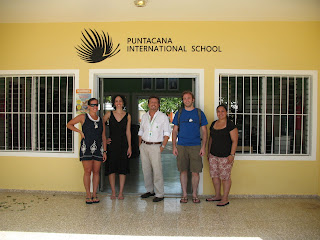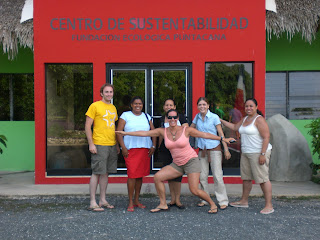
- Gain an understanding ofthe structures of the two schools involved in this collaboration
- Become familiar with each schools curriculum in order to plan meaningful exchanges
- Develop a working relationship with all parties involved- Columbia University, MS88, Punta Cana International School
- Explore the rich ecological resources in the Dominican Republic
- Investigate ways to incorporate scientific inquiry, technology, environmental education, and contemperary science into the classroom
- Make preliminary plans for methods of collaboration (see details below)
- Set long-term goals (see details below)
 Jeffrey Lancaster, Columbia University; Mary Subero, Isabel Tejeda, Ayleen Lopez, Punta Cana International School; Isabel Azcona, Cristi Rau-Lagos, MS 88 Brooklyn
Jeffrey Lancaster, Columbia University; Mary Subero, Isabel Tejeda, Ayleen Lopez, Punta Cana International School; Isabel Azcona, Cristi Rau-Lagos, MS 88 Brooklyn
Methods of Collaboration
•Virtual fieldtrips
•Smartboard
•Video (live streaming and recorded)
•Sharing of real-time data
•Discussion boards
•Resource exchange
•Project website
•Other ideas?
–Punta Cana teachers travel to NY
–Students rely on each other for data sharing
–Open communication
–Students from NY/DR interact individually while being monitored to ensure that the major interaction is academic and does not turn into primarily a social sharing vehicle like AIM
•Long-Term Goals
–Professional development of middle and high school teachers
–Increase awareness and practical knowledge of graduate students, teachers, and students in regards to environmental stewardship
–Cultural and social exchanges supported by technology
–Students participate in original research in earth, ecology, and environmental science
–Enhance communication & teaching skills of Columbia’s exceptional STEM doctoral students
–Support scientific content, inquiry-based instruction and the use of technology in the classroom